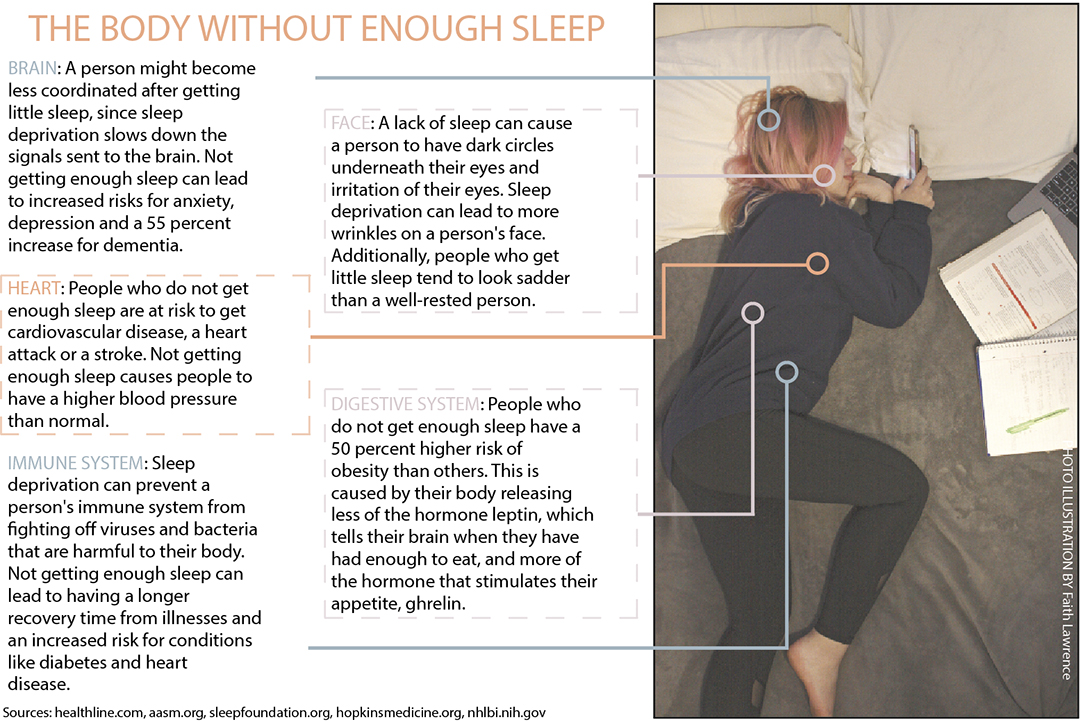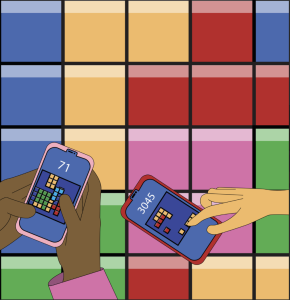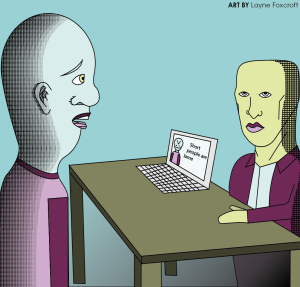Students sacrifice suitable sleep
January 4, 2020
‘Sometimes as a teacher… it feels a little like I am teaching half-zombies’
It is a never-ending cycle. Waking up after snoozing your alarm multiple times. Rolling out of bed. Getting ready for school and rushing out the door, forgetting to eat breakfast. Wearily staying awake during four long classes before attending practices after school. Watching TikTok until realizing you should start on your homework. Sleeping for a short amount of time. Repeat.
After the 4:30 bell rings, most students make their way home to begin homework or spend time with friends, but junior Alyssa Shumaker still has assignments to finish at school. After a long day of classes, technical theater rehearsals, debate practice, and homework, Shumaker rarely gets more than six hours of sleep a night.
“For me, everything is focused on the future,” Shumaker said. “I’m just kind of sucking up being super busy with homework and extracurriculars right now because everything that I do is important enough to me that it’s worth sacrificing sleep. However, I definitely find that it’s harder to pay attention in classes when I’m tired or when I’ve stayed up late.”
Insufficient sleep and tiredness, also known as sleep deprivation, has been affecting students mostly since their middle school years. According to the National Sleep Foundation, teenagers should be getting around eight to 10 hours of sleep each night, while in reality, only 15 percent of high school students get eight and a half hours of sleep.
“Lack of quality sleep basically can underlie almost any condition, any sickness, or illness in a person’s body and break it down,” psychology teacher Kris Grandinetti-Johnson said. “You will not perform as well cognitively and you certainly won’t retain information as well. You tend not to handle stress as well when you are tired and that’s going to affect your decision making.”
Shumaker believes teachers tend to assume their class is a top priority for students and forget that teenagers have other classes that require homework, however students tend to prioritize extracurriculars.
“It usually takes me several hours to finish my homework but that’s considering that I don’t work straight through all four hours or so,” junior Alex Johnson said. “Even if it is not that important to their grade, people just want to be done with all of their work. I think that people don’t plan ahead for more important things like tests, so they finish their homework but they don’t get enough sleep to do well on the tests.”
EXTRACURRICULARS
During the last couple of days before a show, known to theater students as tech week, technicians and actors tend to rehearse until 9 or 10 p.m. in order to complete finishing touches on the show. People involved in shows have stayed as late as 12:30 a.m. during tech week.
“I would say that during tech week, I get around four or five hours of sleep each night, which definitely affects me during the day,” Shumaker said. “It becomes harder for me to go to classes and get things done. But, I put up with the long rehearsals and little sleep because the end product of the musical is absolutely worth it. In my future, tech will be a part of what I want to do. Learning how to manage that time is important.”
Students like Johnson as well as Shumaker find it difficult to spend time with their friends outside of school activities due to excessive amounts of homework and attempts at getting enough sleep.
“Homework can get piled on really fast and is something that I sometimes cannot prepare for so I usually have to stay up late to finish it,” Johnson said. “I often have nights where I get around three hours of sleep a couple [of] nights a row. I just find moments whenever I can but often hanging out with friends means sacrificing time doing homework. If I want to go out with my friends, I have to cram for school work later.”

SLEEP VS SCHOOL
The American Academy of Pediatrics found that as many as 73% of high school students are not getting enough sleep at night. With this high percentage, many students become less focused and more distracted during school hours.
“Students’ attention spans are getting shorter,” Grandinetti-Johnson said. “Sleep affects attention and [the] level of interest even in things that are pretty interesting on a universal level. Sometimes as a teacher, I’m looking at the group, and it feels a little like I am teaching half-zombies because they have kind of a blank stare with not a lot of emotion or interest in anything.”
A study done at the University of Kentucky concluded that coffee was the most commonly used substance that alters brain function, called a psychoactive drug. The study found that 76 percent of students use coffee to combat sleep deprivation.
“If it is several days in a row, getting little sleep can affect me during school, but if it’s just one or two nights, I can drink a bunch of coffee and I’ll be fine,” Johnson said. “But if it’s several nights in a row, even if I drink coffee, I will still be slow and I won’t do as well in school.”
In order to lessen the amount of stress students receive from schoolwork and sleep patterns, Shumaker suggests that teachers become more understanding during busy times in students’ lives, and Johnson suggests that teachers make more homework assignments non-mandatory.
“I feel like a lot of homework is just practice and the students that want to do well in the class will do the homework anyway,” Johnson said. “I think a lot of homework, especially ones that are just practice problems, should be made optional. I think teachers should just keep homework to what is strictly necessary for class the next day.”









